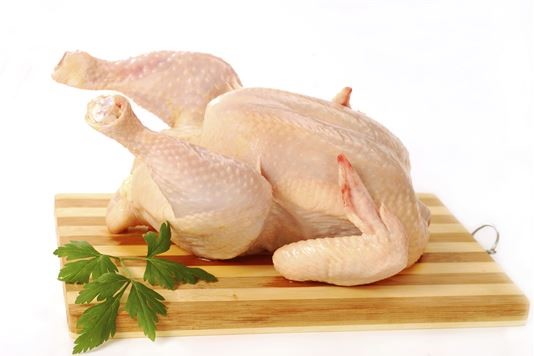Food bug found in nearly three-quarters of supermarket chicken

FSA completes 12 months of testing for campylobacter in shop chickens.
The Food Standards Agency (FSA) has published the final set of results from its year-long investigation into the prevalence of campylobacter in fresh supermarket chickens.
The final statistics show that 73% of chickens tested positive for the presence of campylobacter, which is the most common cause of food poisoning in the UK. And 19% of all the chickens contained more than 1,000 colony forming units per gram (>1,000 cfu/g), which is the point at which the FSA classifies food as ‘highly contaminated’.
Final campylobacter contamination results
Over the course of the last year, over 4,000 samples were taken, and packaging was also tested. A total of 7% of all packaging tested positive for the presence of campylobacter, but only 0.1% of these samples were found to be highly contaminated.
The survey has shown that not a single retailer has managed to keep campylobacter contamination among its stock of fresh chickens under 65%.
|
Retailer |
Number of |
% skin samples positive for campylobacter |
% skin samples |
% pack samples positive for campylobacter |
|
Asda |
662 |
80.4% |
29.7% |
1.4% |
|
The Co-operative |
378 |
78.1% |
19.1% |
4.9% |
|
M&S |
130 |
67.1% |
17.4% |
2.9% |
|
Morrison’s |
349 |
75.8% |
22.0% |
11.2% |
|
Sainsbury’s |
557 |
69.7% |
16.4% |
4.9% |
|
Tesco |
1,235 |
66.5% |
12.8% |
4.0% |
|
Waitrose |
111 |
73.8% |
18.4% |
9.7% |
|
Others* |
589 |
76.8% |
23.9% |
6.7% |
|
Total |
4,011 |
72.8% |
19.4% |
6.7% |
*Others includes retailers like Lidl, Aldi, Iceland and independent convenience stores and butchers, etc.
Table source: Food Standards Agency
Meeting the target
Marks & Spencer, Morrisons, the Co-op and Waitrose have now implemented reduction plans, which the FSA welcomed, and commented that new data showed a significant decrease in campylobacter contamination in these stores.
Asda said last year that it was working with its supplier Faccenda to implementing the use of 'SonoSteam' technology, which treats raw chickens with a burst of steam to kill bacteria.
Steve Wearne, FSA Director of Policy, said that while he was “delighted to see the really encouraging results from these four supermarkets and their suppliers”, he challenged the retailers who had not yet demonstrated improvement to follow in their footsteps.
“We expect all retailers and processors to be achieving the reductions we have seen in these retailers’ figures,” he said, as they are still a long way from the target. In 2008 the proportion of chickens testing positive for the highest level of contamination was 27%, and it was agreed in 2010 that this should be reduced to 10% by 2015.
At 19%, the number of chickens tested and found to be highly contaminated is nearly double that target set five years ago, and there’s still a worryingly high quantity testing positive for campylobacter, even if they’re not ‘highly contaminated’ by FSA definition. While the current results are “encouraging,” there’s still a long way to go.
A new FSA survey will begin this summer to assess whether interventions have made a difference to the level of poultry contamination.
How to avoid campylobacter
Food poisoning can be avoiding by making sure that contaminated boards and utensils are properly washed, and don’t come into contact with other ingredients. Washing your hands and not washing raw chicken also helps to prevent the spread of bacteria.
Storing your chicken correctly (covered and chilled) and cooking the meat thoroughly, ensuring the chicken is steaming hot throughout and juices run clear, is essential. This kills any lingering bacteria that might cause illness.
You might also be interested in:
New FSA study raises further food poisoning concerns
Stricter food regulations for Wales while rest of UK falls behind
Comments
Be the first to comment
Do you want to comment on this article? You need to be signed in for this feature